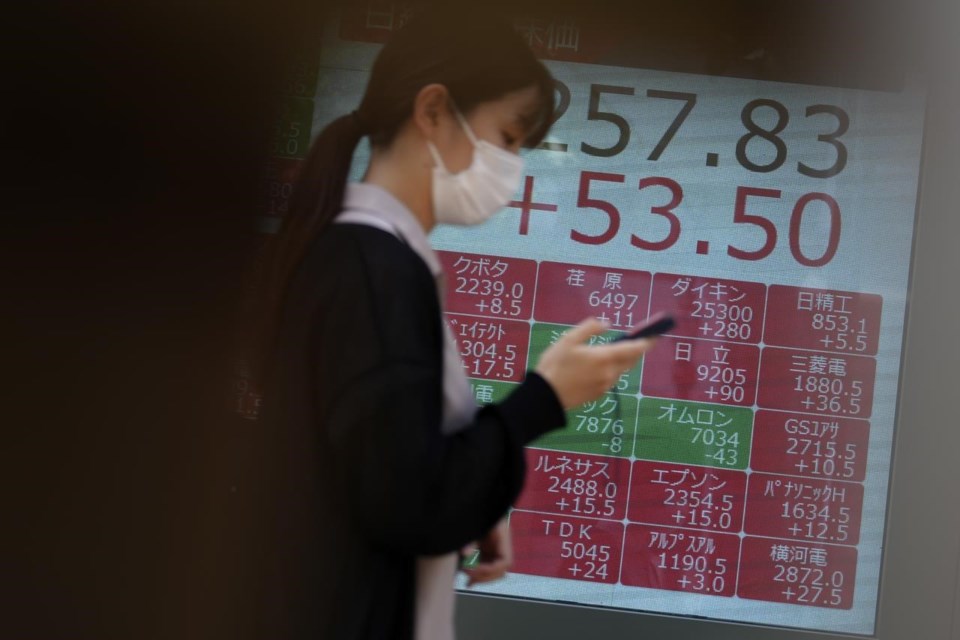TOKYO (AP) — Asian benchmarks mostly fell Thursday after shares declined on Wall Street and investors braced for a highly anticipated report on U.S. inflation.
The U.S. government later in the day will give the latest monthly update on inflation the nation's consumers are experiencing, and economists expect to see an acceleration to 3.3% in July from 3% in June.
Tina Teng, markets analyst at CMC Markets, called the looming U.S. update “a pivotal event for global markets.”
Inflation in China also remains a huge concern. “A slowdown in consumer spending and high-interest rates remain issues for the global economy,” said Teng.
Japan’s benchmark Nikkei 225 added less than 0.1% to 32,230.70 in morning trading. Australia’s S&P/ASX 200 shed nearly 0.1% to 7,331.90. South Korea’s Kospi lost 0.4% to 2,594.10. Hong Kong's Hang Seng slipped 0.7% to 19,121.20, while the Shanghai Composite fell nearly 0.1% to 3,242.21.
On Wall Street, the S&P 500 fell 31.67, or 0.7%, to 4,467.71 for its sixth drop in seven days. The Dow Jones Industrial Average lost 191.13, or 0.5%, to 35,123.36, and the Nasdaq composite sank 162.31, or 1.2%, to 13,722.02 as Big Tech stocks led the declines.
Stocks have cooled in August since soaring 19.5% through the first seven months of the year. Several reasons are behind the mini-pullback, including criticism that Wall Street too quickly formed a consensus that inflation will keep cooling, the economy will keep growing and the Federal Reserve has already finished its hikes to interest rates.
Economists say the last bit of improvement . Fed officials have said repeatedly that their upcoming decisions on interest rates will depend on the latest economic data, on inflation and the job market in particular.
“With risks turning increasingly two-sided, Fed officials are beginning to shift the focus toward how long to hold rates steady at sufficiently restrictive levels,” according to economists at Deutsche Bank.
A rise in inflation that’s much worse than expected could raise fears that the Fed’s job in battling inflation is far from done and that it may have to keep hiking interest rates. At the least, it could push the Fed to keep rates high for longer than expected.
High rates slow inflation by grinding down the entire economy and hurting investment prices. The Fed has already pulled its federal funds rate to the highest level in more than two decades. With rate hikes historically taking a long time to take full effect across the economy, the risk of a recession still remains.
In the meantime, companies continue to offer profit reports for the spring that are mostly better than analysts expected.
Axon Enterprise, the company behind Tasers and Axon body cameras, jumped 14.1% for the biggest gain in the S&P 500. It reported much stronger profit for the spring than analysts expected.
Akamai Technologies also helped to lead the market after beating forecasts for both profit and revenue. Its stock rose 8.5%.
Outside of earnings, after the company said it's paying $1.5 billion for the exclusive rights to re-brand its sports-betting app with the ESPN name.
On the losing end of Wall Street was Lyft, which skidded 10%. The ride-share company reported better results for the latest quarter than expected, and its forecasts for the current quarter also topped forecasts. But analysts highlighted some cautious comments from the company for expectations for the end of the year.
WeWork plunged 38.6% to 13 cents after saying there's substantial doubt about its ability to stay in business as it burns through cash. The workspace-sharing company has already had a couple spectacular rises and falls in its history, and it reported a larger loss for the spring than expected.
Nvidia was the heaviest weight on the S&P 500, falling 4.7%. The chipmaker is one of the stocks that have rocketed this year due to Wall Street's frenzy around artificial-intelligence technology, raising fears that they went too far.
Other Big Tech stocks also fell, and their movements pack more punch on the S&P 500 because of their massive size. Amazon sank 1.5%, Microsoft fell 1.2% and Tesla dropped 3%. The threat of high rates tends to hit technology and other high-growth stocks the hardest.
In the bond market, the yield on the 10-year Treasury slipped to 4.00% from 4.03% late Tuesday. That yield helps set rates for mortgages and other loans.
The two-year Treasury yield, which moves more on expectations for action by the Fed, rose to 4.80% from 4.76%.
In energy trading, benchmark U.S. crude slipped 13 cents to $84.27 a barrel. Brent crude, the international standard, fell 12 cents to $87.43 a barrel.
In currency trading, the U.S. dollar edged up to 143.82 Japanese yen from 143.67 yen. The euro cost $1.0969, inching down from $1.0979.
____
AP Business Writer Stan Choe contributed.
___
This version has been corrected to show that the euro cost inched down from $1.0979, not from $2.0979.
Yuri Kageyama, The Associated Press



